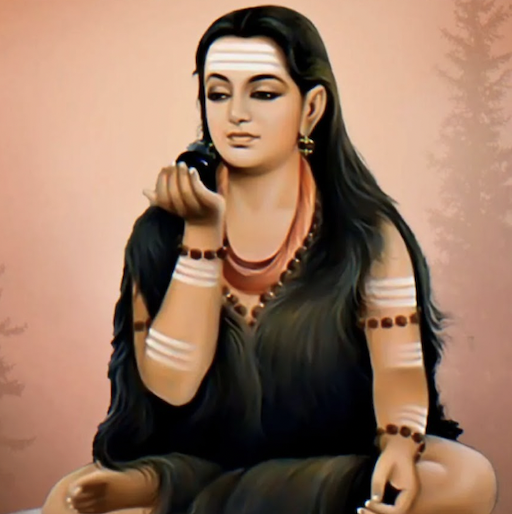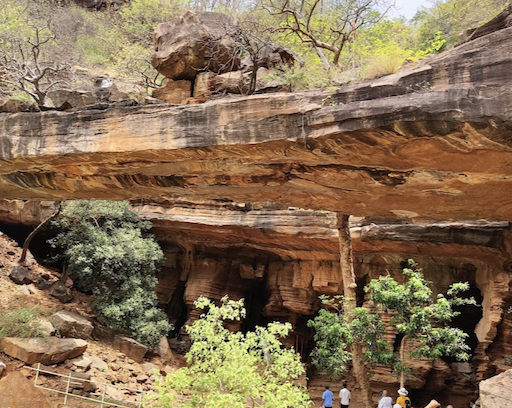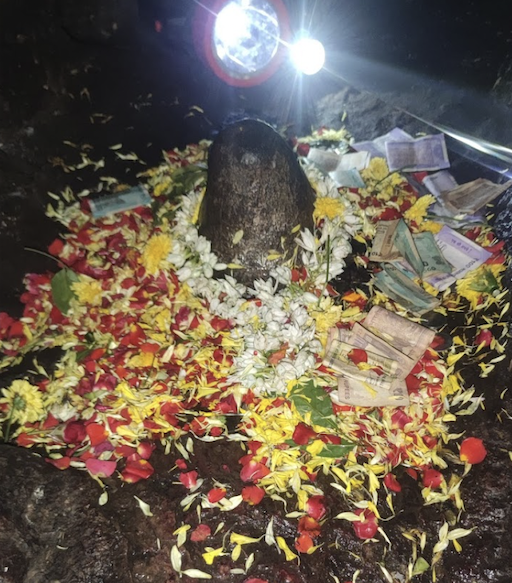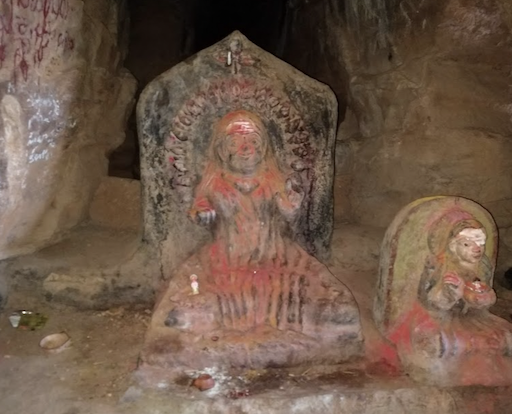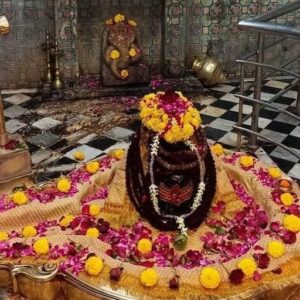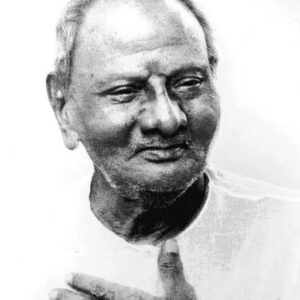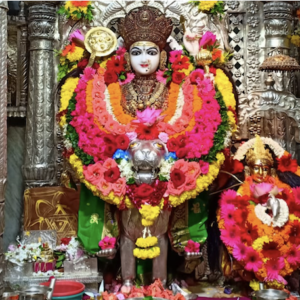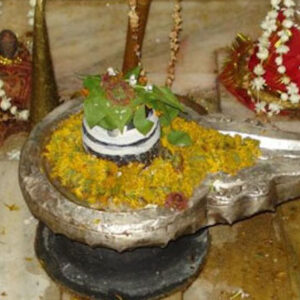This is a cave where Akka Mahadevi did sadhana. The space towards the right of the Akka Mahadevi’s idol is conducive for meditation.
There is a place to sit and meditate. You can go into meditative states here effortlessly.
How to get there:
You can buy tickets for boat package to and return from Akka Mahadevi Caves starting a queue of 5 AM at Srisailam. There are limited tickets. Tickets starts at 6 AM
Cave location: https://maps.app.goo.gl/HoQ77v3uHHHdgYQJ6
Ticket location from Srisailam: https://maps.app.goo.gl/Ffyj2FNZ2bg2MzjY8
About Akka Mahadevi
Akka Mahadevi (Kannada: ಅಕ್ಕ ಮಹಾದೇವಿ, c. 1130–1160) was one of the early poets of Kannada literature[1] and a prominent person in the Lingayat Shaiva sect in the 12th century.[2] Her 430 Vachana poems (a form of spontaneous mystical poems), and the two short writings called Mantrogopya and the Yogangatrividh are considered her known contributions to Kannada literature.[3] She composed fewer poems than other saints of the movement. The term Akka (“elder Sister” or “mother”) is an honorific given to her by saints such as Basavanna, Siddharama and Allamaprabhu and an indication of her high place in the spiritual discussions held at the “Anubhava Mantapa”.[4] She is seen as an inspirational woman in Kannada literature and in the history of Karnataka. She considered the god Shiva (‘Chenna Mallikarjuna’) as her husband, (traditionally understood as the ‘madhura bhava’ or ‘madhurya’ form of devotion).[citation needed]
Biography
Akka Mahadevi was born in Udutadi, near Shivamogga in the Indian state of the Karnataka[5] around 1130.[6] Some scholars suggest that she was born to a couple named Nirmalshetti and Sumati, who were both devotees of Para Shiva.[7] Western sources claim that little is known about her life, though it has been the subject of Indian hagiographic, folk and mythological claims, based on oral tradition and her own lyrics. One of her lyrics, for instance, appears to record her experiences of leaving her place of her birth and family in order to pursue Shiva.[5]
Tharu and Lalita also document a claim that a local Jain king named Kaushika sought to marry her, but that she rejected him, choosing instead to fulfil the claims of devotion to the deity Para Shiva.[5] However, the medieval sources that form the basis of this account are ambiguous and inconclusive.[8] They include a reference to one of her poems, or vachanas, in which she lays down three conditions for marrying the king, including control over the choice to spend her time in devotion or in conversation with other scholars and religious figures, rather than with the king.[7] The medieval scholar and poet Harihara suggests in his biography of her that the marriage was purely nominal, while other accounts from Camasara suggest that the conditions were not accepted and the marriage did not occur.[7]
Harihara’s account goes on to say that when King Kaushika violated the conditions she had laid down, Akka Mahadevi left the palace, renouncing all her possessions including clothes, to travel to Srisailam, home of the god Para Shiva.[7] Alternative accounts suggest that Akka Mahadevi’s act of renunciation was a response to the king’s threats after she refused his proposal.[9] It is likely that she visited the town of Kalyana en route, where she met two other poets and prominent figures of the Lingayat movement, Allama and Basava.[5] She is believed to have travelled, towards the end of her life, to the Srisailam mountains, where she lived as an ascetic and eventually died.[5] A vachana attributed to Akka Mahadevi suggests that towards the end of her life King Kaushika visited her there, and sought her forgiveness.[7]
History
She is considered by modern scholars to be a prominent figure in the field of female emancipation. A household name in Karnataka, she wrote that she was a woman only in name and that her mind, body, and soul belonged to Shiva. During a time of strife and political uncertainty in the 12th century, she chose spiritual enlightenment and stood by her choice. She took part in convocations of the learned such as the Anubhavamantapa in Kalyana (now Basava Kalyana) to debate philosophy and enlightenment (or Moksha, termed by her as “arivu”). In search for her soul mate Lord Shiva, she made animals, flowers and birds her friends and companions, rejecting family life and worldly attachment.
Akka’s pursuit of enlightenment is recorded in poems of simple language but intellectual rigour. Her poetry explores the rejection of mortal love in favour of the love of God. Her vachanas also talk about the methods that the path of enlightenment demand of the seeker, such as killing the ‘I’, conquering desires and the senses and so on.
Kausika belonged to the Jain community, that was wealthy and resented by the rest of the population. She rejected her life of luxury to live as a wandering poet-saint, travelling throughout the region and singing praises to her Lord Shiva. She went in search of fellow seekers or sharanas because the company of the saintly or sajjana sanga is believed to hasten learning. She found the company of such sharanas in Basavakalyana, Bidar district and composed many vachanas in praise of them. Her non-conformist ways caused consternation in the conservative society of the time: even her guru Allama Prabhu faced difficulties in including her in the gatherings at Anubhavamantapa.
An ascetic, Mahadevi is said to have refused to wear any clothing. Legend has it that due to her true love and devotion with God her whole body was protected by hair.
All the sharnas of Anubhavamantapa, especially Basavanna, Chenna Basavanna, Kinnari Bommayya, Siddharama, Allamaprabhu and Dasimayya greet her with a word “Akka”. In fact it is here onwards that she becomes Akka, an elderly sister. Allama shows her the further way of attaining the transcendent bliss of union with Lord Chenna Mallikarjuna. Akka leaves Kalyana with this following vachana:
Having vanquished the six passions and become
The trinity of body, thought and speech;
Having ended the trinity and become twain – I and the Absolute
Having ended the duality and become a unity
Is because of the grace of you all.
I salute Basavanna and all assembled here
Blessed was I by Allama my Master-
Bless me all that I may join my Chenna Mallikarjuna
Good-bye! Good-bye!
In the first phase of her life she renounced worldly objects and attractions; in the second, she discarded all object-based rules and regulations. In the third phase she began her journey towards Srishila, location of the temple to Chenna Mallikarjuna and a holy place for devotees of Shiva since before the 12th century. Akka’s spiritual journey ended at Kadali, the thick forest area of Shrisaila (Srisailam) where she is supposed to have experienced union (aikya) with Chennamallikarjuna.
One of her famous vachana translates as:
People,
male and female,
blush when a cloth covering their shame
comes looseWhen the lord of lives
lives drowned without a face
in the world, how can you be modest?When all the world is the eye of the lord,
onlooking everywhere, what can you
cover and conceal?
Her poetry exhibits her love for Chenna Mallikarjuna, and harmony with nature and simple living.
She sang:
For hunger, there is the village rice in the begging bowl,
For thirst, there are tanks and streams and wells
For sleep temple ruins do well
For the company of the soul I have you, Chenna Mallikarjuna
Read More
